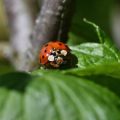Understanding Garden Pests and Pollinators in the UK
British gardens are home to a wide variety of insects and small creatures, some of which can be troublesome pests while others play a vital role as pollinators. Common garden pests in the UK include aphids, slugs, snails, vine weevils, and caterpillars. These pests often feed on leaves, stems, and roots, causing visible damage to plants and sometimes spreading disease. On the other hand, key pollinators such as bumblebees, honeybees, butterflies, hoverflies, and certain beetles are crucial for the reproduction of many flowers and crops. Maintaining a healthy balance between managing pests and supporting pollinators is essential for a thriving garden ecosystem. Overusing chemical pesticides may harm beneficial insects and disrupt this balance. By understanding the different species present in your garden and their roles, you can adopt natural strategies that keep pest numbers under control without threatening pollinator populations or overall biodiversity.
2. Encouraging Biodiversity as Natural Pest Control
One of the most effective natural ways to manage garden pests while supporting pollinators is to encourage biodiversity in your outdoor space. By creating a varied habitat, you invite a healthy balance of insects that naturally keep pests under control and offer vital resources for bees, butterflies, and other pollinators. The British countryside is famous for its patchwork of wildflower meadows and native hedgerows—bringing some of this diversity into your garden can make all the difference.
Why Biodiversity Matters
A diverse garden provides food, shelter, and breeding sites for beneficial insects such as ladybirds, lacewings, hoverflies, and solitary bees. These creatures act as natural pest controllers by preying on aphids, mites, and other common nuisances, while pollinators help your plants flourish.
Simple Ways to Boost Garden Biodiversity
| Action | Benefits |
|---|---|
| Plant native flowers | Attracts local pollinators and beneficial insects adapted to UK conditions |
| Leave wild corners or patches | Provides habitat for ground beetles, spiders, and nesting bees |
| Create log piles or bug hotels | Shelters overwintering insects that prey on pests |
| Add a small pond or water dish | Supports frogs, toads, and birds that feed on slugs and insects |
Choosing the Right Plants
Select a mix of flowering plants that bloom at different times from spring through autumn. Native species such as foxglove (Digitalis), knapweed (Centaurea), oxeye daisy (Leucanthemum vulgare), and hawthorn (Crataegus) are excellent choices for British gardens. Not only do these support a variety of insects, but they also help maintain the ecological balance so no single pest can dominate.
Creating Insect-Friendly Spaces
Avoid using chemical pesticides which can harm both pests and beneficial species alike. Instead, focus on building insect-friendly spaces: let some areas grow wild, keep leaf litter in winter, and provide water sources. Such simple steps turn your garden into a thriving ecosystem where nature itself keeps pests in check while giving pollinators everything they need to survive.

3. Non-Chemical Pest Management Strategies
Keeping your garden healthy and free from pests doesn’t have to mean reaching for harsh chemicals. There are plenty of effective, natural methods that keep unwanted insects at bay while protecting bees, butterflies, and other essential pollinators.
Companion Planting
Companion planting is a traditional British gardening technique where certain plants are grown together to deter pests naturally. For example, planting marigolds alongside vegetables can repel aphids and whiteflies, while strong-scented herbs like basil or chives can confuse pests looking for their favourite crops. Try growing nasturtiums with cabbages to lure away cabbage moths—these sacrificial plants attract the pests and keep your main crop safer.
Homemade Sprays
If you spot troublesome insects, consider homemade sprays made from ingredients found in your kitchen. A mild soap solution (using a few drops of washing-up liquid in water) can help control greenfly without harming pollinators when sprayed directly on affected leaves. Garlic and chilli infusions also make excellent deterrents; simply strain the mixture before use and spray in the evening when bees are less active.
Physical Barriers
Barriers offer a practical way to protect vulnerable plants. Fine mesh netting or horticultural fleece can stop cabbage whites and carrot flies from laying eggs, while still allowing light and rain through. Copper tape around pots deters slugs without using harmful pellets. Always check barriers regularly to ensure no helpful insects become trapped inside.
Choose Pollinator-Friendly Solutions
When choosing any pest management strategy, always opt for methods that specifically target pests and avoid broad-spectrum products that could affect pollinators. By focusing on natural deterrents, you’re supporting both your garden’s health and the wider environment—a win-win for gardeners across the UK.
4. Welcoming Garden Wildlife Allies
One of the most effective and natural ways to control garden pests is by inviting wildlife allies into your outdoor space. In the UK, animals such as hedgehogs, birds, and ladybirds play a crucial role in keeping unwanted insects under control while causing no harm to pollinators. By creating a welcoming environment for these helpful creatures, you can reduce the need for chemical interventions and support local biodiversity.
Tips for Attracting Beneficial Wildlife
- Hedgehogs: Leave small gaps in fences (about 13cm wide) so hedgehogs can roam freely. Avoid using slug pellets that are toxic to them, and provide log piles or leaf heaps for shelter.
- Birds: Install bird feeders with seeds and fat balls, particularly in winter. Add nesting boxes and let some shrubs grow wild to offer natural food sources and hiding spots.
- Ladybirds: Plant native flowers such as cow parsley or yarrow to attract ladybirds. Avoid spraying pesticides; these beetles will naturally keep aphid numbers down.
Wildlife-Friendly Features Table
| Wildlife Ally | Garden Feature | Benefit |
|---|---|---|
| Hedgehog | Log piles, hedgehog highways | Eats slugs, beetles, caterpillars |
| Birds | Nesting boxes, feeders, berry bushes | Feeds on caterpillars, snails, aphids |
| Ladybirds | Diverse flowering plants, bug hotels | Controls aphids and scale insects |
Caring for Your Garden Allies
- Avoid using chemical sprays or pellets as they can harm both pests and their natural predators.
- Provide fresh water sources like shallow dishes or ponds for birds and other wildlife.
- Create undisturbed corners where creatures can shelter safely throughout the year.
By making your garden a sanctuary for these helpful species, you build a thriving ecosystem where natural pest management supports pollinators and enriches your local environment.
5. Protecting and Supporting Pollinators
Ensuring your garden remains a safe haven for pollinators is essential when managing pests naturally. Here are practical steps you can take to provide food, shelter, and water for bees, butterflies, and other pollinating insects, while avoiding harm to these vital creatures.
Offer a Variety of Nectar-Rich Plants
Choose a diverse selection of native British wildflowers such as foxgloves, lavender, and comfrey. Plant in clusters so pollinators can easily locate their preferred blooms. Aim for plants that flower at different times of the year to ensure a continuous food source from early spring to late autumn.
Create Safe Habitats
Leave some areas of your garden undisturbed. Allow patches of long grass, piles of leaves, or logs to remain as natural shelters for overwintering bees and butterflies. Install bee hotels or bug boxes in sunny, sheltered spots to encourage solitary bees to nest safely.
Provide Clean Water Sources
Place shallow dishes or birdbaths with stones for insects to land on. Change the water regularly to keep it fresh and prevent mosquitoes. Even a small puddle or rainwater tray can give pollinators a much-needed drink during dry spells.
Avoid Harmful Chemicals
Never use pesticides or weedkillers that could threaten pollinators. Instead, hand-pick pests or use barriers like fine mesh netting to protect delicate plants. Opt for organic solutions such as neem oil sprays only if absolutely necessary and apply them at dusk when pollinators are less active.
Work with Nature’s Balance
Encourage beneficial insects like ladybirds and lacewings that prey on common garden pests. Companion planting—growing marigolds or nasturtiums alongside vegetables—can deter aphids naturally without disrupting the delicate ecosystem that supports pollinators.
6. Seasonal Tips for Sustainable Pest Management
Managing garden pests naturally while supporting pollinators in the UK requires a thoughtful, season-by-season approach. Here are some practical tips to help you keep your garden healthy and buzzing with life all year round.
Spring: Prepare and Protect
As new growth emerges, inspect plants regularly for signs of pests like aphids or slugs. Encourage ladybirds and lacewings by planting early-flowering herbs such as chives and borage. Use physical barriers, such as copper tape around raised beds, to deter slugs without harming beneficial insects.
Summer: Support Pollinators and Monitor Pests
During the summer months, plant nectar-rich flowers like lavender, foxgloves, and marigolds to attract bees and butterflies. Water early in the morning to avoid creating damp conditions that favour pests like snails. Hand-pick larger pests and use organic mulches to suppress weeds and reduce pest habitats.
Autumn: Clean Up Responsibly
Remove diseased plant material promptly but leave some seed heads and hollow stems for overwintering pollinators. Compost healthy garden waste to reduce pest breeding grounds. Consider sowing green manure crops to improve soil health and deter some soil-borne pests naturally.
Winter: Plan Ahead
Use this quieter time to clean tools, repair structures, and plan crop rotations for next year. Install bug hotels or leave log piles to offer shelter for pollinators through cold months. Avoid disturbing leaf litter too much, as it provides habitat for beneficial insects that help control pests come spring.
Consistent, Year-Round Actions
Throughout the year, avoid broad-spectrum pesticides that can harm both pests and pollinators. Maintain diverse planting schemes to support a balance of wildlife in your garden. By following these seasonal tips tailored for UK gardens, you’ll encourage natural pest control while safeguarding precious pollinator populations.


